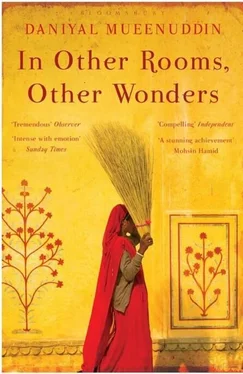When the party had come far along, when Harouni and the guests were standing in a circle, drinks in hand, gesturing expansively, speaking loudly, Sonya walked away from the group. Looking along the length of the valley, she caught sight of Rezak’s cabin, several terraces below the picnic spot. Finding the pathway, she picked her way toward it, and Rezak, who had been watching her, quickly followed, leaping down a steep bank so that he could receive her at his little hut, saluting.
‘It’s wonderful !’ exclaimed Sonya, circling around the cubicle, Rezak at her heels. ‘Hey everyone,’ she called to her guests, going over to where she could be heard. ‘Come see.’
Short bowlegged Rezak bustled around, showing off the appliances and refinements — the pipe that drained the inside spittoon, the cupboards and drawers set into the outside walls for his tools and clothes and kit, windows that could be propped open or removed entirely, a skylight made of red glass, thick rush matting on the roof to keep the inside cold or hot, with a rubber bladder fixed to the wall that shot water up through a pipe when he squeezed it, wetting the rushes — evaporative cooling. Sonya poked her head inside the stuffy, lurid chamber, considered the photographs of movie starlets plastered on the walls. The guests peered about, inspecting this nest, its door and windows ajar, like a car on a dealer’s lot with hood and trunk propped open.
‘If there’s electricity, then it’s really something,’ Rezak said, eager, grinning with all his teeth, surrounded by the Sahibs and the Memsahibs. ‘I used to have colored lights inside. There’s work to be done, that’s true. It’s all broken from carrying it up and down and all over.’ In his exuberance he pulled at a cupboard door that wouldn’t open until it tore off in his hand. Even this didn’t dampen him. ‘See, that’s one way to take it apart!’
‘That’s the man’s whole life in a nutshell, isn’t it?’ the Australian Ambassador, a tall man with a correspondingly tall forehead and ginger hair, remarked.
As they were returning to the picnic, Sonya said to her husband, ‘The poor man should have electricity for a radio and for lighting. He lives all alone here, imagine how bored he is.’
‘Are you kidding?’ Harouni said. ‘These guys don’t get bored.’
But after the party, the wire that had been laid temporarily so that there would be music remained in place — for the next party. Rezak strung lights on the outside of the cubicle, like wedding decorations, and hung a lightbulb in the stone hut where he cooked. He bought a radio, and finally bought a cheap television, something he had never even thought of wanting. He would lie in his cocoon, soft red lights glowing, the television volume turned up, and drink cup after cup of tea kept hot in a vacuum thermos.
Sitting in the Kalapani teahouse one morning, Rezak met a young man who lived near his childhood home high in the mountains.
‘The government pushed the road up to Koti,’ the man told him. ‘The bus runs from Kowar. That changed things, you can bet.’
Hearing of the places he had known all his life made Rezak restless. He had left home determined never to go back. Now he wondered what his stepbrothers had told the neighbors about his disappearance. He wanted his family to know of his success.
‘You and I grew up drinking from the same streams, breathing the same air. You have to accept my hospitality now that we’ve met. I beg you. Come for a cup of tea, and then I’ll walk you back down here.’ He took the man by the arm and almost dragged him out of the tea stall.
He hurriedly carried a charpoy onto the terrace in front of the stone cooking hut, put a pillow on it, ran inside and lit a fire in the hearth, then brought out a table, wiping it with a rag. Luckily he had a packet of biscuits and he arranged these on a plate and carried them out with the tea.
The man knew of Rezak’s family, but had little news of them. Forgetting his bitterness and the wrong they had done him, Rezak began speaking of his stepbrothers and nephews, of their fertile land, of the well near their fields.
‘God has been good to me, more than I deserve. I have only one wish, that He had given me sons of my own, as my brothers have.’ He ran his hands over his face.
Rezak had not been able to resist boasting of his salary.
The man considered for a moment, his eyes alighting on a locked trunk inside the cooking hut that must be full of clothes and who knows what else. He looked at the neat vegetable patch and at the two goats — Rezak had bought another when fodder ran low in the forest and they were cheap. The man had been shown the weird little cubicle, furnished with a radio, a television even.
‘Look, my cousin has a daughter. Something went wrong when she was born, and she’s a bit simple. But she can cook and sew and take your goats out to graze. She’s quite pretty even. She’s young enough to bear you a son. Her father can barely take care of his other children. Why don’t you let me arrange a marriage?’
‘You’re making fun of an old man,’ replied Rezak. But hope and desire pierced his heart when he thought of it. A woman in his house, even one who was not right in the head! And she could bear him a son, and that would be worth anything at all. Now that Rezak had money, the boy would go to school, he would learn to read and write, become — Rezak could not even imagine what. The son of an old servant at the main house had become a doctor and now continually begged his father to retire and come live with him. Rezak would die happy after that.
They spoke back and forth all afternoon. In the end they agreed not only that the girl would be without a dowry, but even that Rezak would pay a quite substantial amount of money for her, which the family would take in installments.
A few days later the father delivered the feebleminded girl. The girl’s family had not come, and the two men did not celebrate the marriage, but brought the maulvi quietly to perform the nikah . When the father left, the girl followed him and cried, until finally they were forced to lock her in the hut.
After seeing the father onto the bus, Rezak wandered down through the bazaar, stopping to talk for a minute with the man who sold samosas, saying nothing of his marriage, but saving it for himself. He felt more equal now among these people, the shopkeepers, passersby, families. Someone waited for him also, the house he returned to would not be empty.
The poor girl must be frightened, he thought, and turned homeward, stopping to buy a three-kilo box of sweets, fat yellow ludhoos, ghulab jaman, barfi, shahi tukrah .
He rattled the chain as he opened the lock, so that she wouldn’t be startled. She wore makeup, lipstick that had smudged, rouge that made her cheeks almost pink, new clothes made of shiny white cloth — at least that much had been done to celebrate their wedding day. It pleased him that she reached and covered her head with her dupatta — shy before him, her husband.
He sat across from her. She kept her eyes cast down.
He opened the box of sweets, carefully unknotting the string, took out a ludhoo, and held it out to her on his palm, whispering, ‘Take this, it’s okay, don’t be afraid.’ He held it there. ‘Go on.’ And after a moment, without looking up, she reached out and took it.
Gradually, she became accustomed to living with him. He let her roam as she wanted, once he saw that she would not run away. The girl, a tiny thing of nineteen or twenty, had an impediment and spoke not in sentences but rather in strings of sound, cooing or repeating words — her condition was really worse than Rezak had expected — but when she settled in he found that she could more or less cook.
Читать дальше












